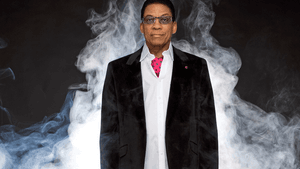Stay in the Loop
BSR publishes on a weekly schedule, with an email newsletter every Wednesday and Thursday morning. There’s no paywall, and subscribing is always free.
"Rockit" man returns
Kimmel Center presents Herbie Hancock

I’m used to walking into the Kimmel Center’s Verizon Hall and seeing scores of music stands, countless string players tuning up, and patrons staring back at me from their perch in the conductor’s circle. It’s the home of the Philadelphia Orchestra, after all — an organization long known for its unique, sometimes overwhelming sound. So it was slightly jarring to enter the auditorium for Herbie Hancock’s performance and find only a grand piano, a few synthesizers, and a towering drum set occupying the massive stage.
Despite the sparse instrumentation, I had no cause to worry that the evening would be musically underpowered. From the moment jazz legend Hancock took the stage, accompanied by a supergroup of sidemen, he engaged the audience in a thrilling sonic journey that spanned nearly two unbroken hours.
Beyond categorization
Hancock’s style has always defied categorization. A classical piano prodigy who played with symphony orchestras as an adolescent, he found his way to jazz as a young adult, eventually joining the legendary Miles Davis Quintet. As a solo artist in the 1970s and ‘80s, he helped develop the foundation for what we now call jazz fusion. In 2007, he released River: The Joni Letters, an extraordinary riff on the music of Joni Mitchell; it became only the second jazz record to win the Grammy Award for Album of the Year.
Now in the sixth decade of his career, Hancock’s current musical language remains steadfastly unclassifiable. His Philadelphia concert skewed heavily toward new music — presumably from a long-gestating studio album, scheduled for release in 2018. “Overture,” the 20-minute opening number, emerged as a marvel of controlled chaos.
Hancock began the piece by programming his synthesizer for several minutes with near-monastic focus. Although the resulting soundscape occasionally dipped into bland jazztronica, I often sensed the influence of taiko drumming in the composition’s strongly syncopated rhythm. This inclusion may be a nod to Hancock’s longtime practice of Nichiren Buddhism and fascination with the musical language of Japan.
But the piece’s most interesting elements became evident when Hancock segued to the grand piano. Against the electronica’s pounding pulse, Hancock accentuated a perfect legato line on the piano, which he occasionally broke with sharp percussive strikes. This style melded with the support provided by drummer Vinnie Colaiuta. Not content to merely “ride the cymbal,” Colaiuta layered rhythms that seemed almost in direct conversation with the synth.
Credit where credit's due
Hancock kept interstitial banter to a minimum; his only moments of effusion came when introducing, and praising, his band. There was good reason for this. Hancock has always had a knack for building strong musical partnerships, and his current lineup is no exception. In addition to Colaiuta — an 18-time winner of Modern Drummer magazine’s Drummer of the Year — the evening’s musical support included James Genus (the current house bassist for Saturday Night Live) and Terrace Martin (a saxophonist for whom the term “virtuoso” seems a woeful understatement).
Both Genus and Martin had moments in the spotlight as Hancock dipped into his back catalog. During “Actual Proof,” Genus’s extended glissando bass solo — effortless yet overwhelming — mirrored a steadily beating heart. And in the middle of “Watermelon Man,” Martin unleashed a saxophone solo that seemed to possess his whole body. He spun and wove with the music, visibly sweating buckets, but never wavered in deploying unbelievable breath control. From his piano, Hancock looked on in awe — in that, he was not alone.
As I left Verizon Hall, I overheard a well-dressed older man tell his companion that Hancock’s Maiden Voyage (1965) was the first jazz album he ever bought. “I like it better than Kind of Blue,” he said, referencing the seminal 1959 record by Hancock’s former boss, Miles Davis.
After this concert, I understand why.
What, When, Where
Herbie Hancock. Herbie Hancock, piano and keyboards; Vinnie Colaiuta, drums; James Genus, bass; Terrace Martin, saxophone and keyboards. Various selections. October 4, 2017, at the Kimmel Center’s Verizon Hall, 300 S. Broad Street, Philadelphia. (215) 790-5883 or kimmelcenter.org.
Sign up for our newsletter
All of the week's new articles, all in one place. Sign up for the free weekly BSR newsletters, and don't miss a conversation.
 Cameron Kelsall
Cameron Kelsall